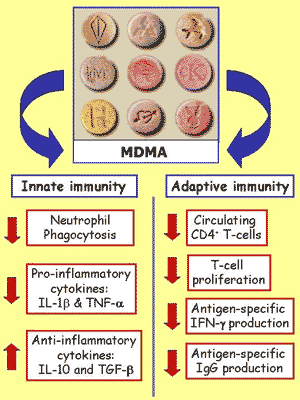| 2003 |

|
YEAR BOOK |
Trinity College Dublin
|
Immunosuppressive effects of drug abuse: focus on MDMA 'Ecstasy'
|

My research is focused on the widely abused amphetamine derivative methylenedioxymethamphetamine (MDMA 'Ecstasy'), and has demonstrated that MDMA has immunosuppressive properties in an in vivo rat model. Specifically, MDMA suppresses production of the pro-inflammatory cytokines, tumor necrosis factor-a (TNF-a) and interleukin (IL)-1b, both of which are vital components of the cellular immune response to invading pathogens. MDMA also increases production of IL-10, an endogenous immunosuppressive cytokine that down-regulates many aspects of the immune response. Such a reduction in IL-1b and TNF-a production, coupled with increased production of IL-10, is likely to increase susceptibility to infectious disease.
As well as compromising innate immunity, I have also demonstrated that MDMA suppresses adaptive immunity, in that it suppresses T-cell responses and IgG2a antibody production following an in vivo antigen challenge. As IgG2a is a critical antibody subtype in the immune response against viruses, it is suggested that exposure to MDMA could have a detrimental effect on anti-viral immunity. In addition to the effects of MDMA that I have observed in rats, recent studies have demonstrated that MDMA has similar effects on the human immune system. Moreover, a considerable window of immunosuppression exists following ingestion of MDMA in humans, with some of the effects still evident up to 48 hours following administration.
My research indicates that the aforementioned effects of MDMA are not due to a direct action of the drug on immune cells, but rather due to the release of endogenous immunosuppressive substances. For instance, I have recently demonstrated that increased IL-10 production following MDMA administration is dependent on activation of the sympathetic nervous system, and can be blocked by pre-treatment with b-adrenoceptor antagonists. Work in my laboratory in Trinity College Dublin is currently examining the role of nervous system-driven IL-10 production in MDMA-induced suppression of antigen-specific immunity.
The data resulting from these studies will give us a better understanding of the molecular mechanisms by which MDMA suppresses the immune system.
Contact: Dr Thomas Connor, Department of Physiology, Trinity College Institute of Neuroscience, Trinity College, Dublin 2; E-mail: [email protected]